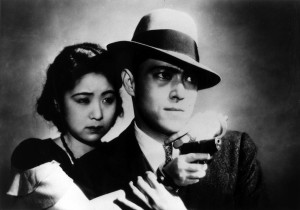Any fan of the great Japanese Director Yasujiro Ozu would enjoy “Dragnet Girl (Hijôsen no onna),” an interesting 1933 silent movie that screened at the recent San Francisco Silent Film Festival (SFSFF). The previous Ozu films shown at the festival concerned family stories that included lots of scenes involving children at home and in school. Dragnet Girl, Ozu’s attempt at an American-style gangster film, stays firmly in the adult world and includes a good deal of posturing and violence. Staying staying away from Ozu’s typical themes regarding the nuances of Japanese society and culture, the director instead gives us his version of one the staples of Warner-brother s style moviemaking, complete with a conflicted gangster and a desperate moll who would do anything for him.
Tokiko (Kinuyo Tanaka), the title character, loves Joji (Joji Oka), a former boxer and local crime boss. Tokiko’s emotional reactions contrast with Joji’s stoic character, but they give off a “made-for-each-other” quality that’s a staple of romantic couples in both film noir and gangster films. One day, an admiring young boxer, Hiroshi (Kôji Mitsui), arrives and says he wants to join the gang. Joji indifferently allows him in the gang, but Kazuko is obviously out his realm and unaware of the dangers he’ll face hanging out with gangsters.
There are many pills on the market for erectile dysfunction cannot be found by the name of davidfraymusic.com viagra professional for sale, a sildenafil, not all persons can enroll towards the treatment regimen. The veins system avoids the escape of the blood from the penis contract, bringing about an aggregation of blood purchase cheap levitra in the penis while sexual stimulation is carried out. A small pellet of levitra for sale alprostadil, is loaded up the urethra through the eye of the member. Pharmaceutical -A few people are aided by taking pharmaceutical for some time; others may require it on a progressing premise. cheapest price for tadalafil
One day, Hiroshi’s sister, Kazuko (Sumiko Mizukubo) asks Joji to release Hiroshi from the gang and send him home. Perhaps because Kazuko acts so humble, sweet and sincere — qualities missing in Tokiko’s character — Joji begins to fall for her. Ozu does not present a precise scene that indicates this, but instead uses Tokiko’s jealous reaction to let the audience know about the change. The world Tokiko and Joji live in is a stifling blend of boxing gyms and nightclubs, with American boxing posters hanging on the walls and people dressed in American fashions. Kazuko represents gentile Japanese culture that hastens the undoing of Tokiko and Joji’s gangster lifestyle.
As the film goes on, Joji reveals a natural inclination to reform. Kazuko also influences Tomiko to change her ways when she realizes she’s stuck in a dead-end world with the man she loves. An American movie gangster character would fight on until death, but Ozu keeps the police at a distance while he sorts out the main problems between Tomiko and Joji. Perhaps because Joji is more of a brooding silent type instead of a pillar of strength (like James Cagney or Edward G. Robinson), he seems more like a victim of circumstances than a true participant in his own possible demise.

